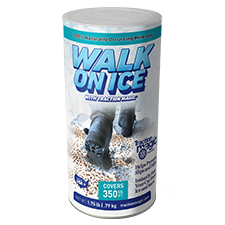Concrete Vs Asphalt: A Winter Weather Perspective
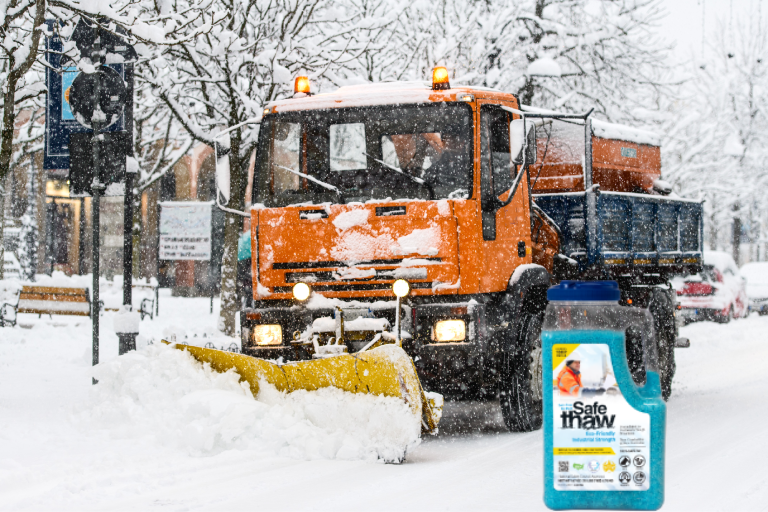
When winter arrives, the battle for superior road surfaces commences with concrete vs asphalt. Which material withstands the harsh winter conditions better? The answer lies in a thorough understanding of their respective characteristics.
Concrete, known for its durability and strength, can withstand extreme temperature fluctuations, making it resistant to cracking and potholes. On the other hand, asphalt offers a smoother surface and quicker snow removal due to its dark color.
In this blog, we delve into the winter weather perspective, examining how concrete and asphalt perform when faced with freezing temperatures, snow, and ice. For your convenience, you’ll mention an ice melt solution that works well on both concrete and asphalt to keep your surface areas clean and safe.
Characteristics Of Concrete And Asphalt To Winter Weather
Concrete and asphalt, the two primary materials used in construction, exhibit distinct characteristics in winter weather. Understanding these traits is essential for effective road maintenance and safety during the colder months.
Characteristics Of Concrete
Concrete possesses durability and strength, enabling it to withstand the challenges of winter. It exhibits resistance to extreme temperature fluctuations, minimizing the risk of cracks and potholes. The robust nature of concrete makes it a reliable choice for roads in areas prone to freezing temperatures.
Characteristics Of Asphalt
Asphalt offers a smooth surface that aids in efficient snow removal. Its dark color facilitates faster melting of snow and ice. However, asphalt is more susceptible to temperature changes, making it prone to cracking and deterioration during freezing conditions. Regular maintenance is crucial to preserve its functionality.
Asphalt Driveway Cost vs Concrete: A Winter Weather Perspective
When it comes to choosing between asphalt and concrete for your driveway, winter weather adds another layer of complexity. Both materials react differently to freezing temperatures, snow, and the use of deicing agents. Comparing asphalt driveway cost vs concrete involves not just upfront expenses but also long-term maintenance and environmental considerations. In this article, we’ll break down the key differences, maintenance practices, and innovative solutions to help you make an informed choice.
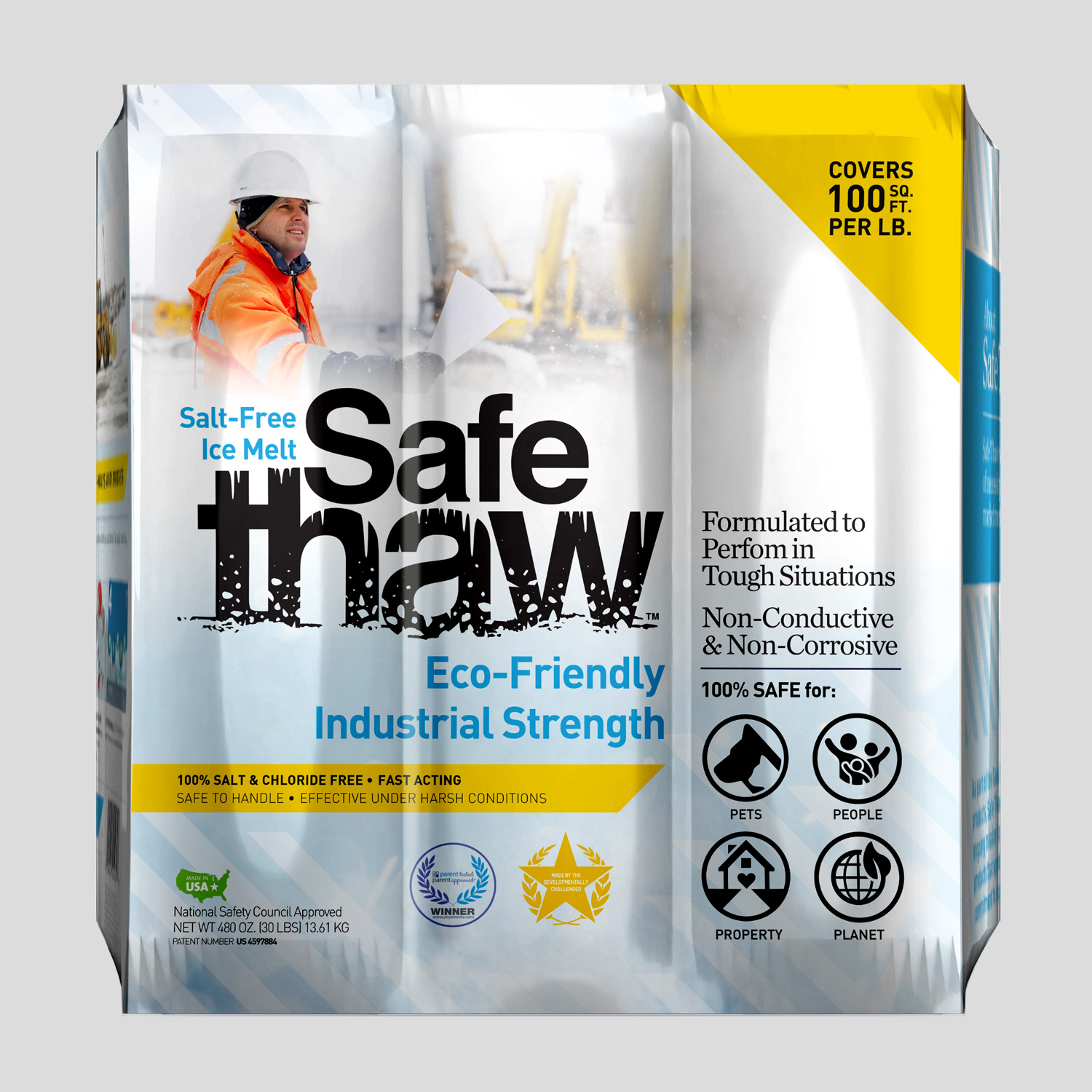
Blizzards Are Here—Stock Up on Safe Thaw Today!
Safe Thaw was created as the ice management solution for tough winter environments. Ideal in commercial and industrial properties, shops, government agencies, bridges, and construction.
Winter Performance: Concrete Vs Asphalt
Winter brings challenges for both concrete and asphalt, and the battle between concrete and asphalt intensifies. Let’s uncover the strengths and weaknesses of concrete and asphalt when faced with the harsh realities of winter weather.
Freezing Temperatures
Both concrete and asphalt encounter freezing temperatures during winter, but their response differs. Concrete is more resistant to temperature fluctuations, which helps prevent cracking and structural damage. Conversely, asphalt can become more brittle in extreme cold, increasing the likelihood of cracks and potholes forming.
Snow-Covered Roads
Snow poses a significant challenge for road surfaces, and here the characteristics of concrete and asphalt come into play. Concrete’s light color absorbs less heat from the sun, slowing down snow melting. Conversely, asphalt’s dark color absorbs more heat, aiding in faster snow removal. However, the smoother surface of asphalt can be advantageous, allowing plows to clear snow more efficiently.
Icy Conditions
Regarding ice, the traction and safety of road surfaces become crucial. Concrete generally provides better traction due to its rougher texture, reducing vehicle sliding risks. Asphalt, with its smoother surface, can become more slippery, requiring additional measures such as de-icing agents or sand to enhance traction and ensure safer driving.
Winter Storms Are Here!
Stay Safe with Our 100% Salt And Chloride-Free, Pet Safe Ice Melt.
Deicing Chemicals
Deicing chemicals are common during winter but can affect concrete and asphalt differently. Concrete is more resistant to the corrosive properties of deicing chemicals, making it a suitable choice for areas where chemical usage is prevalent. Asphalt, however, is more susceptible to damage from these chemicals, requiring careful application and maintenance to mitigate the effects.
Long-Term Performance
Over time, winter weather can take a toll on road surfaces. Concrete’s durability and resistance to cracking contribute to its long-term performance, making it a preferred option in regions with severe winters. Asphalt, while requiring more regular maintenance to address cracking and deterioration, can still provide satisfactory performance with proper upkeep and repairs.
Maintenance And Repair: Concrete Vs Asphalt
When it comes to maintenance and repair, both concrete and asphalt surfaces require attention in the winter. A crucial aspect of winter maintenance is effectively combating ice and snow.
Maintenance Practices for Concrete and Asphalt in Winter
Winter weather can be particularly harsh on driveways, making regular maintenance crucial for both asphalt and concrete surfaces.
Concrete Maintenance in Winter
Concrete driveways are prone to scaling and cracking due to freeze-thaw cycles. To protect them:
- Sealing: Apply a concrete sealant every 2–3 years to create a barrier against moisture and deicing chemicals.
- Crack Repair: Inspect for cracks before winter and fill them to prevent water infiltration, which can expand during freezing temperatures.
- Snow Removal: Use plastic shovels or snow blowers to clear snow without scratching the surface.
Asphalt Maintenance in Winter
Asphalt is more flexible than concrete, which allows it to handle freeze-thaw cycles better, but it still requires upkeep:
- Filling Potholes: Address potholes promptly to prevent them from expanding due to ice formation.
- Reapplying Sealcoat: A fresh layer of sealcoat every few years adds protection against moisture and UV rays.
- Deicing Agents: Use eco-friendly products to prevent surface degradation and protect the environment.
Consistent maintenance ensures the longevity and safety of both asphalt and concrete driveways during winter.
Preventing Cracks And Potholes
Regular maintenance prevents cracks and potholes on concrete and asphalt surfaces. For concrete, applying a high-quality sealant can protect against freeze-thaw cycles, reducing the risk of cracking. On the other hand, asphalt surfaces can benefit from timely crack sealing and filling, preventing water infiltration and subsequent freeze-thaw damage.
Snow Removal Techniques
Efficient snow removal is essential for both concrete and asphalt surfaces during winter. In that case, Safe Thaw, an ice melt solution, can be an ideal choice for concrete and asphalt surfaces. Its unique formula helps prevent damage and provides safer conditions for pedestrians and vehicles.
Patching And Resurfacing
Over time, both concrete and asphalt may require patching and resurfacing to address wear and tear. Concrete patching involves removing damaged sections and replacing them with new concrete. For asphalt, crack sealing and filling are commonly used to address minor damage, while larger areas may require resurfacing with new asphalt layers.
Proper Drainage Systems
Maintaining proper drainage systems is crucial for both concrete and asphalt surfaces. Adequate drainage prevents water from pooling and infiltrating the pavement, which can lead to accelerated deterioration and damage. Regular inspections and cleaning of drainage channels, gutters, and downspouts are essential to ensure efficient water flow and minimize the risk of surface damage.
Professional Maintenance And Repair Services
In some cases, seeking professional maintenance and repair services can benefit concrete and asphalt surfaces. Experienced contractors can provide thorough assessments, identify underlying issues, and offer tailored solutions to ensure the longevity and performance of road surfaces in winter conditions. Regular inspections and timely repairs can help mitigate potential issues and minimize long-term maintenance costs.
Environmental Impact of Deicing Agents on Pavement Materials
The choice of deicing agents not only affects the environment but also the structural integrity of your driveway.
- Impact on Asphalt:Traditional deicers like rock salt can cause asphalt to dry out and become brittle over time. This increases the likelihood of cracks and potholes. While asphalt is generally more resistant to chemical damage than concrete, repeated exposure to chloride-based products can still degrade its quality.
- Impact on Concrete:Concrete is highly susceptible to damage from deicing agents, particularly chloride-based products, which can accelerate scaling and spalling. These chemicals seep into the pores of the concrete, exacerbating freeze-thaw damage. Opting for Gaia Enterprises products, like Safe Thaw, offers a chloride-free, eco-friendly alternative that melts ice effectively without harming concrete.
- Environmental Considerations:Runoff from deicing agents can pollute waterways, harm vegetation, and disrupt local ecosystems. Using environmentally safe products not only preserves driveway materials but also reduces the ecological footprint of winter maintenance.
How Do Salt And De-Icing Chemicals Affect Concrete And Asphalt?
Salt and de-icing chemicals have a detrimental effect on both concrete and asphalt road surfaces. These substances, while effective in melting ice and snow, can accelerate the deterioration of the materials.
In the case of concrete, salt and de-icing chemicals penetrate the surface, causing corrosion of the reinforcing steel and leading to cracks and spalling. Asphalt, too, suffers from the application of these chemicals. The salts seep into the pavement, weakening its structure and causing cracks and potholes.
Moreover, the repeated freeze-thaw cycles aggravate the damage. The negative impact of salt and de-icing chemicals on concrete and asphalt underscores the need for proper maintenance and alternative strategies to minimize their usage, ensuring the longevity and durability of road surfaces.
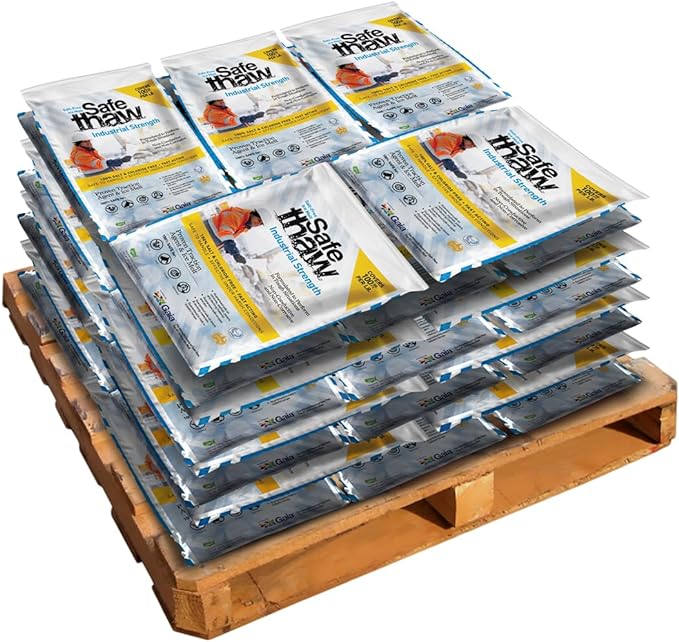
40 Bags
Safe Paw Thaw Industrial Strength Salt-Free Pet Safe Snow Ice Melter and Traction Agent for Concrete, Asphalt, Decks, Lawns, and More, 43 Pound Bag- 40 Bags
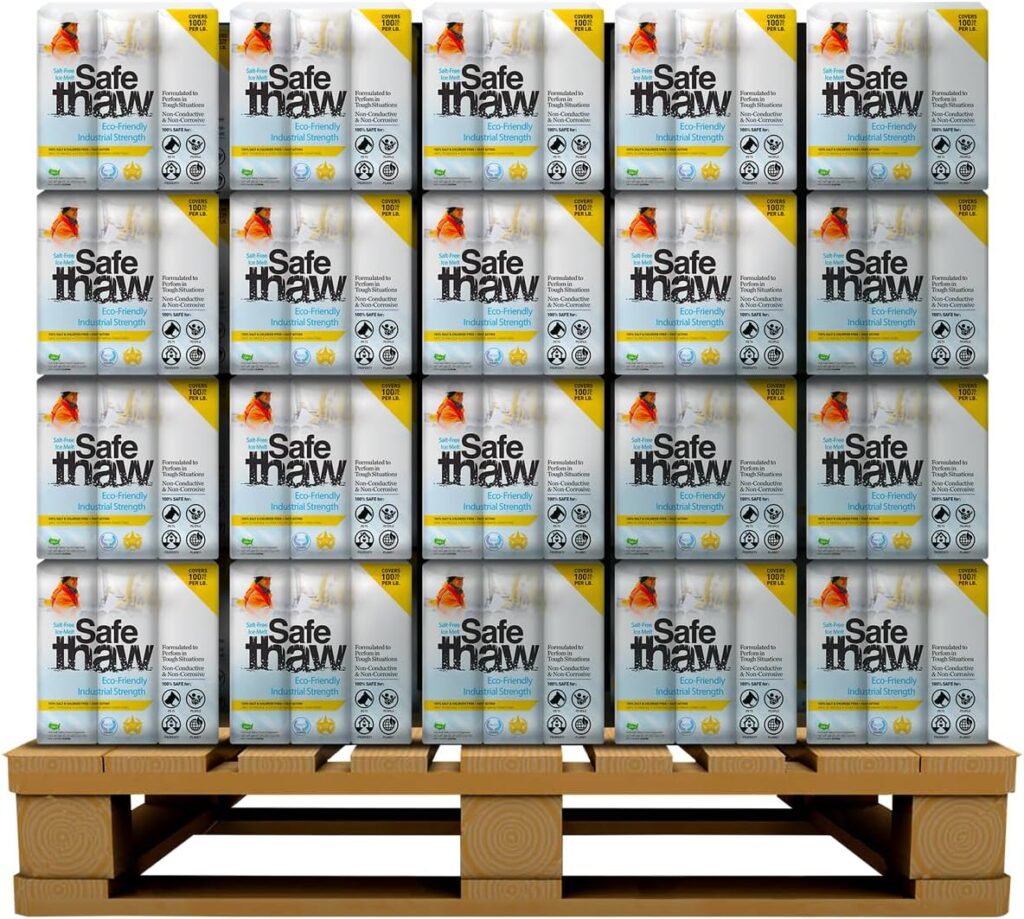
100 Boxes
Safe Thaw Industrial Strength 100% Salt/Chloride-Free, Pet/Paw-Safe Snow & Ice Melter and Traction Agent. Use on Concrete, Asphalt, Roofs & On Any Surface, 30 Pound FlexiPail- 100 Boxes
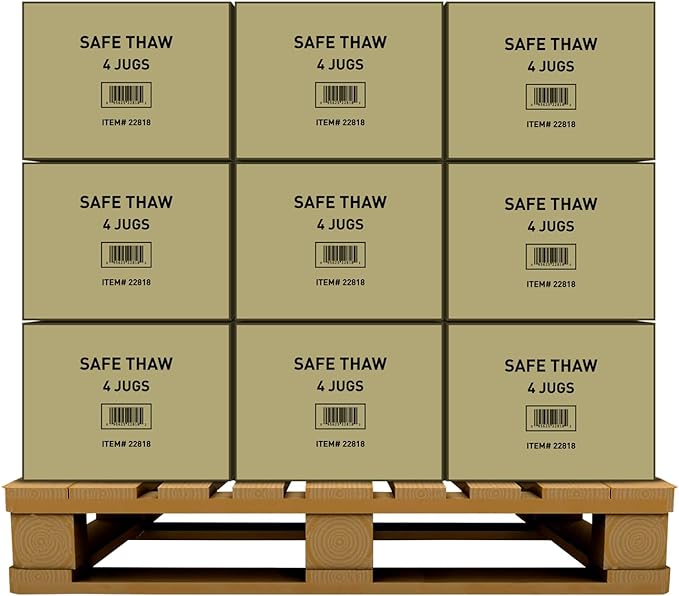
105 Jugs
Safe Thaw Concrete Safe 100% Salt-Free, Pet Safe Snow and ice Melter, Industrial Strength, Chloride-Free, and Traction Agent. Use on Asphalt, Roofs & On Any Surface, 10 Pound Jug- 105 Jugs
Cost Analysis: Installation and Long-Term Maintenance
Comparing the concrete vs asphalt driveway cost involves looking beyond initial installation to long-term expenses for maintenance and repairs.
H3: Initial Installation Costs
- Asphalt: Typically costs $3–$7 per square foot, making it the more affordable option for upfront expenses.
- Concrete: Costs range from $5–$10 per square foot, but stamped or decorative options can be significantly higher.
H3: Long-Term Maintenance Costs
- Asphalt: Requires frequent resealing every 3–5 years and occasional pothole repairs, adding to long-term costs.
- Concrete: While initial sealing is essential, concrete generally requires less frequent maintenance, making it more cost-effective over time.
H3: Lifespan Comparison
- Asphalt: Lasts 20–30 years with proper care.
- Concrete: Can last 30–40 years, but only with proactive maintenance to prevent scaling and cracking.
Balancing installation costs with long-term expenses helps homeowners make an informed choice based on budget and durability needs.
H2: Innovative Technologies for Enhancing Winter Performance
Advances in materials and construction techniques are revolutionizing driveway performance in cold climates.
H3: Heated Pavements
Heated driveways use embedded heating elements to melt snow and ice automatically, eliminating the need for deicing agents and reducing maintenance. While the upfront cost is high, the convenience and longevity benefits make it an attractive option for harsh winters.
H3: Permeable Pavements
Permeable concrete and asphalt allow water to drain through the surface, reducing ice formation. These materials are particularly useful in areas prone to heavy snowfall and freezing rain.
H2: Choosing the Right Option for Your Driveway
When deciding between asphalt and concrete, consider your budget, maintenance capacity, and environmental priorities. Asphalt is often the more affordable choice upfront, while concrete offers greater durability and lower long-term maintenance costs. However, both materials require regular care, particularly during winter, to withstand harsh conditions.
Products like Safe Thaw from Gaia Enterprises provide a sustainable solution for deicing, protecting your driveway while reducing environmental impact. Additionally, adopting innovative technologies like heated pavements or permeable materials can further improve performance and safety in cold climates.
100% Salt & Chloride-Free Ice Melt for Winter Storm Protection.
Conclusion
Choosing between asphalt driveway cost vs concrete involves more than just comparing upfront expenses. Each material has unique benefits and challenges, particularly during winter. Understanding their maintenance requirements, environmental impacts, and performance in cold weather helps homeowners make informed decisions that align with their needs and budget.
By integrating eco-friendly practices and advanced technologies, such as permeable pavements and deicing products from Gaia Enterprises, you can ensure your driveway remains safe, durable, and visually appealing throughout the winter months.
Try Also Our Other Winter Safety Products:
Safe Paw
The Original and #1 Selling Pet and Child Safe Ice Melt for over 20 years. Guaranteed environmentally safe –It won’t harm animals or children, and it won’t damage your property. That’s Safe Paw. Safe Paw can change how winter affects our planet.

Walk On Ice
The handy disposable canister can be taken everywhere, with the same 100% naturally occurring minerals that provide instant traction on ice or snow. Use it on sidewalks, steps, or as an instant traction agent for your car.
